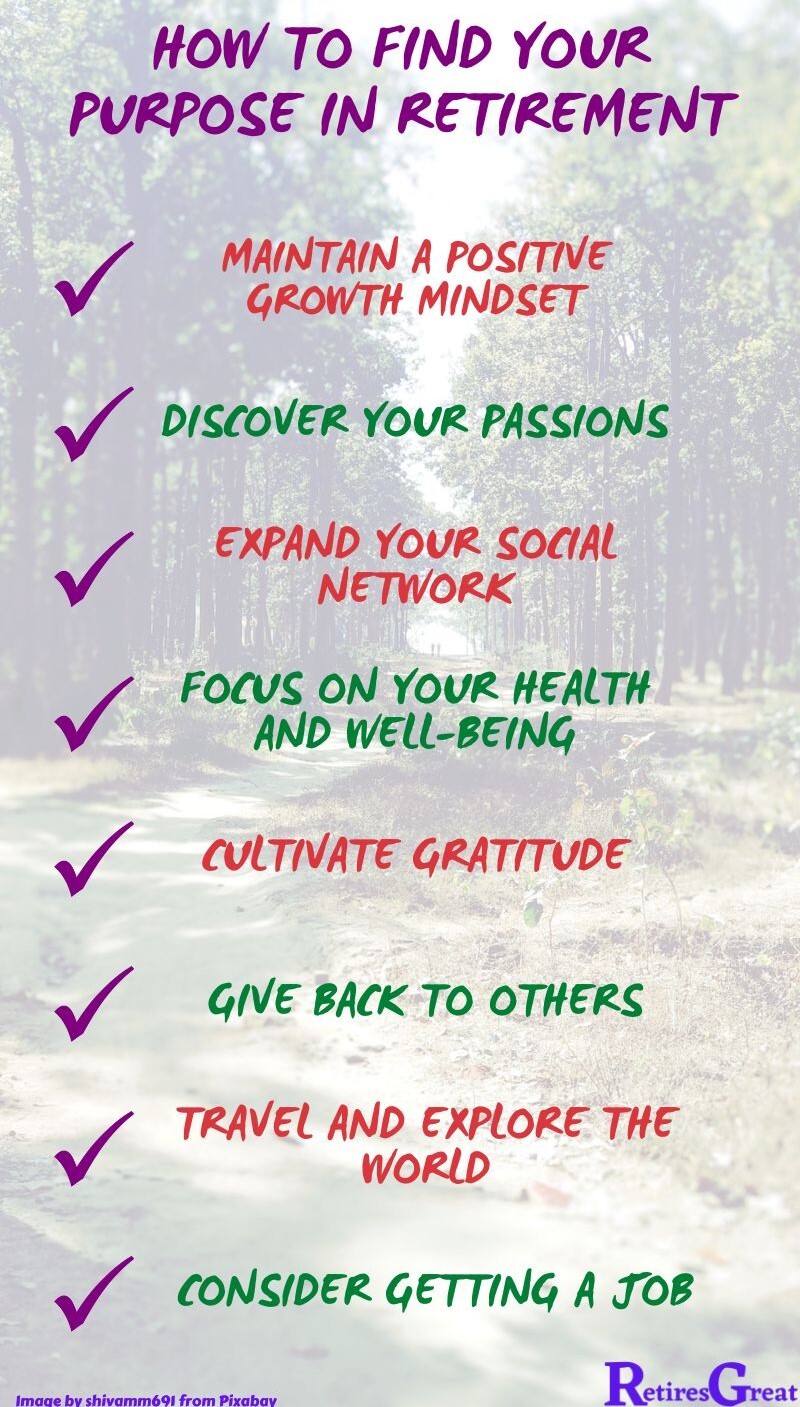Living a purposeful life can help you feel satisfied, content and in control of your own life. Also, feelings of happiness are achieved when you feel you’re contributing or doing something worthwhile. This provides a reason to look forward to each new day.
Sadly, only about 25% of adult Americans feel they have an idea of what makes their life meaningful, with another 40% saying they have no clue or are indifferent.
Retired and Have No Purpose
Some new retirees experience loss of purpose after leaving work. Inherently, their jobs provided structure, stability and a reason to get moving each day. Without internal motivation, they’re at risk of underliving, what should be, their best years.
Purpose, really, is about understanding the “why” of what motivates each of us. After retiring, most folks slow down with the intention of enjoying the good life. Alarm clocks get turned off and the old daily routine goes out the window.
As wonderful as all this sounds, after a while, the novelty begins to wear thin. Even fun things, like getting together with friends or playing a round of golf, can become uninteresting.
What most don’t often realize, their sense of purpose was intertwined with their job and the many demands throughout their working years. This might have included raising a family, paying off the mortgage and all those other pressing demands.
Retirement changes everything!
Those extra 40 plus hours a week aren’t always easy to fill. Mundane tasks or make-work projects consume the days. After a while, it can feel like Groundhog Day.
To find your purpose in retirement becomes of paramount importance. Unless this void is addressed, it can lead to discontentment and boredom. In more severe situations, it can further deteriorate into feelings of isolation and even depression.
What Is a Good Purpose in Retirement?
A good purpose in retirement is one which aligns with your values, passions and interests. It’ll be what’s meaningful and important to you. Often, it will include making a difference for others and being part of the greater good.
Unfortunately, there’s no easy cookie cutter model or drop-down menu of selections. This is because each of us has unique interests and desires.
One person might find volunteer work highly rewarding. Additionally, joining an art group and exploring their passion for oil painting might be equally fulfilling. Of course, someone else might not be interested in either of these things.
More often than not, purpose is more than a singular activity. Rather, it tends to be a composite of the things you find meaningful and of importance.
Purpose Can Change Over Time
Just to complicate matters, what seems important can change over time. Thus, how to find your purpose in retirement can be elusive, changing and anything but a straightforward process.
For example, becoming involved with the local boys / girls’ sports team might be a rewarding activity and very satisfying. However, after a season or two, this might lose appeal.
In other situations, a major project can be all consuming. Imagine a couple in the midst of renovations or downsizing. These can take months or even longer to complete, yet at some point it’ll be completed.
Both are good examples of activities which seem fulfilling, yet might change over time.
How To Find Your Purpose in Retirement
Finding your purpose in retirement can feel daunting, especially for anyone who never really thought about it. At a high level, one might think it’s about becoming a better person, living a more purposeful life or making a difference in the world.
Yet, it need not be some grandiose statement. For most of us, it’s something more tangible which relates to our day-to-day life. Another way of thinking about it is what’s your reason for waking up each morning?
When you have something to look forward to which feels worthwhile and rewarding, you’re well on your way. Besides feeling good, there are numerous benefits associated with your new-found drive.
Benefits Of Finding Purpose
Some of the benefits include:
Each of these benefits contribute to overall well-being and satisfaction. This raises the question; how do you find your “why”?

1. Maintain A Positive Growth Mindset
Maintaining a positive growth mindset is instrumental in understanding and developing your sense of why. By growing as a person and striving to see the good, it helps you see the “bigger picture” which helps identify your purpose.
To be candid, there’ll always be setbacks or something throwing us off kilter. However, what matters most is how we bounce back. Research by Cornell University reveals a sense of purpose can help us maintain an even-keel during even the most negative situations.
Other benefits include better:
2. Discover Your Passions
Your passions can be useful in uncovering those areas which are important to you. These might be hobbies, interests or other activities you enjoy.
While you’d think these should be easy to identify, some retirees feel at a complete loss. They’ve lost touch with what they’re passionate about. This can become a bit of a voyage of self-discovery.
The following steps can assist and help you find your purpose in retirement:
3. Expand Your Social Network
The expression “No man is an island” highlights the importance of others and our social network. In fact, family, friends and community are often intertwined with our sense of purpose and meaning.
Unfortunately, our social circles tend to shrink as we age. This is most noticeable right after leaving the workforce. Many new retirees’ sorely miss the daily interactions with their co-workers. Our article, Loss of Work Friends, explores this phenomenon and thoughts on dealing with this.
People matter more than most of us realize. Ironically, most of us are shy and awkward when it comes to meeting new individuals. This can result in not getting out there or trying anything new.
Our article, Surefire Ways to Make Friends in Retirement, provides strategies on striking up new friendships as well as deepening existing ones. This could be trying a new activity such as a hobby, sport or volunteering.
Not only could it be fun, you might connect with like-minded people and find it rewarding. When this hesitancy is overcome, it opens the door for a more active social life.
4. Focus On Your Health and Well-Being
One could argue living a healthy active lifestyle should provide an almost universal sense of purpose. This should be a top priority for everyone as it can add years of quality life.
Compared to previous generations, we’re living longer lives. The downside is healthcare costs are skyrocketing and may very well wipe out oury retirement savings. Yet, it seems the average person, for the most part, takes their health for granted.
Some troubling statistics include:
The bottom line is there are massive dividends to be had by investing in your health.
5. Cultivate Gratitude
Simply put, gratitude is a deep appreciation for all you have or the people important in your life. Life doesn’t owe anyone anything and being grateful for what you have focuses your attention on your well-being and the concept of give and take.
It allows you to accept the way things are, not the way you want it to be. With that hurdle out of the way, it’s easier to focus on your true purpose.
There are several ways to remind yourself of what you’re thankful for:
Gratitude sets you on a course to discover yourself and your reason for being. It’s one of the steps to help find your purpose in retirement.
For ideas on how to do this, read our post 7 Proven Ways to Cultivate Gratitude for A Happier Retirement.
6. Give Back to Others
Supporting a worthy cause is another way to enhance your sense of meaning. Giving back and contributing to society can also increase feelings of happiness, optimism and satisfaction. When you see the difference it makes for others, it becomes a win-win and your efforts feel worthwhile.
There are many ways to give back either through your time, talent or financially. Several examples could include:
7. Travel And Explore the World
Retirement is often considered the time to travel and see those places you’ve always dreamed about. Whether it’s checking out local attractions, a cross country road trip or flying to distant lands, there’s always lots to see and do.
If travel is your thing, your “why” may become exploring the world around you. The options are almost limitless and a few thoughts include:
If you enjoy travel, there’s a myriad of destinations to explore. These need not be expensive as there are many budget-friendly options.
8. Consider Getting a Job
Retirement isn’t for everyone. This is especially true for anyone who enjoyed their job and, now, feels restless. In fact, there’s a growing trend of baby boomers re-entering the workforce.
According to the Washington Post, an estimated 1.5 million retirees re-entered the US labor market over the past year. This is largely attributed to low unemployment rates, rising costs and greater workplace flexibility.
This isn’t always driven by financial need; it’s about doing something productive. In many situations, it’s not even related to their previous professions. Rather, it’s about doing something they enjoy and gets them out of the house.
These could be either full-time or part-time positions. Other factors to consider include:
As you might surmise, there’s lots to consider before jumping back to work. Our article, Tips to Finding a Job You Enjoy, provides more insights.
Closing Thoughts on Find Your Purpose in Retirement
The majority of new retiree’s plan on slowing down and enjoying their new-found freedom. At first, it’s great and they can do all those things they never had enough time for. After a while, their interest can begin to wane and they feel at loose ends.
One example might be a golf enthusiast looking forward to getting out and improving their game. Now they can play every day, if they so choose. As the novelty wears off, this can start to feel like work. Not to mention how expensive it can become.
What’s missing is a sense of purpose or reason for being. This sustains us and guides our actions making our lives feel worthwhile. Seldom will it be a single thing. Rather, it’s a combination of what we perceive as important. These also tend to evolve over time.


Great information and so important for those of us in retirement or getting ready. Thanks! ~Kathy
I couldn’t agree more! It’s very important and something a lot of people forget about, especially when getting ready to retire. Finding a purpose will make your retirement years truly golden. Thanks for reading and commenting, Kathy! 🙂